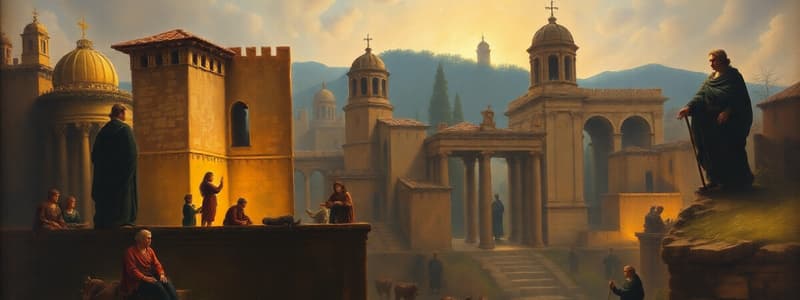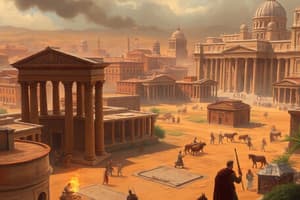Podcast
Questions and Answers
What was a significant factor in the decline of the Roman Empire, aside from external pressures?
What was a significant factor in the decline of the Roman Empire, aside from external pressures?
- Decline in military discipline
- Expansion of political alliances
- Increased agricultural productivity
- Rise of Christian influence (correct)
How did the leadership struggles in Rome contribute to its decline?
How did the leadership struggles in Rome contribute to its decline?
- Leaders prioritized the empire's foreign relations over internal stability
- An authoritarian regime strengthened central control
- Political infighting distracted leaders from external threats (correct)
- Leaders successfully unified the empire against external foes
What change in Roman society is attributed to the rise of Christianity?
What change in Roman society is attributed to the rise of Christianity?
- Inspiration towards nonviolence and belief in a higher purpose (correct)
- A decline in secularism and greed
- An increase in civic duty among citizens
- A shift towards more violent entertainment
What historical event is often compared to the eventual fall of the Western Roman Empire?
What historical event is often compared to the eventual fall of the Western Roman Empire?
What was one misconception held by the power-hungry leaders after Emperor Valens' death?
What was one misconception held by the power-hungry leaders after Emperor Valens' death?
What role did Christianity play during the decline of the Roman Empire?
What role did Christianity play during the decline of the Roman Empire?
Which emperors are mentioned as having displayed complacency that contributed to the empire's decline?
Which emperors are mentioned as having displayed complacency that contributed to the empire's decline?
How did the Romans view the Germanic tribes in relation to their own civilization?
How did the Romans view the Germanic tribes in relation to their own civilization?
What was a contributing factor to the fall of the Roman Empire mentioned in relation to external threats?
What was a contributing factor to the fall of the Roman Empire mentioned in relation to external threats?
What transformation occurred within Christianity as it became more established?
What transformation occurred within Christianity as it became more established?
What was significant about the Battle of Hadrianopolis in 378 CE?
What was significant about the Battle of Hadrianopolis in 378 CE?
What effect did the Gothic integration into the Roman Empire have in the long term?
What effect did the Gothic integration into the Roman Empire have in the long term?
Who was Alaric, and what was his role in the context of the Western Roman Empire?
Who was Alaric, and what was his role in the context of the Western Roman Empire?
What characterized the aftermath of the Battle of Hadrianopolis for the Roman Empire?
What characterized the aftermath of the Battle of Hadrianopolis for the Roman Empire?
How did the Germanic tribes affect the future of the Roman Empire after the defeat at Hadrianopolis?
How did the Germanic tribes affect the future of the Roman Empire after the defeat at Hadrianopolis?
What was one consequence of the loss of noble estates in Gaul and Britain for Roman culture?
What was one consequence of the loss of noble estates in Gaul and Britain for Roman culture?
What demand did Alaric make from the Roman Empire concerning the Balkans?
What demand did Alaric make from the Roman Empire concerning the Balkans?
What were the two main methods employed by Roman emperors to manage the Goths?
What were the two main methods employed by Roman emperors to manage the Goths?
How did the Romans initially perceive the Goths during their migration into the empire?
How did the Romans initially perceive the Goths during their migration into the empire?
What common aspect tied the two connotations of the term 'barbarian' mentioned?
What common aspect tied the two connotations of the term 'barbarian' mentioned?
What was one consequence of Emperor Valens' delay in addressing the Goths' requests?
What was one consequence of Emperor Valens' delay in addressing the Goths' requests?
What factor contributed to the deterioration of relations between the Goths and the Romans?
What factor contributed to the deterioration of relations between the Goths and the Romans?
Which narrative does the term 'barbarian' evoke according to works of fiction?
Which narrative does the term 'barbarian' evoke according to works of fiction?
What was the main reason for the Goths' migration into Roman territory?
What was the main reason for the Goths' migration into Roman territory?
What outcome resulted from the Goths' influx into Roman territories?
What outcome resulted from the Goths' influx into Roman territories?
Flashcards
Internal Decline of the Roman Empire
Internal Decline of the Roman Empire
The gradual weakening and deterioration of the Roman Empire over time, ultimately leading to its collapse. It involved internal factors like political instability, economic decline, and social unrest.
Greed and Self-Interest in the Roman Empire
Greed and Self-Interest in the Roman Empire
The Roman Empire experienced a decline in moral values, with leaders prioritizing their own power and wealth over the well-being of the empire. This led to corruption and infighting, weakening the government's ability to address challenges.
Influence of Christianity on Roman Decline
Influence of Christianity on Roman Decline
The rise of Christianity, with its emphasis on nonviolence and compassion, challenged the Roman Empire's values of strength and dominance. This change in belief systems contributed to the internal weakening of the empire.
Political Instability and Power Struggles
Political Instability and Power Struggles
Signup and view all the flashcards
Pressure from Germanic Tribes
Pressure from Germanic Tribes
Signup and view all the flashcards
What was the Roman term used to describe Germanic tribes living north of the Roman Empire?
What was the Roman term used to describe Germanic tribes living north of the Roman Empire?
Signup and view all the flashcards
When did the Roman Empire's decline start?
When did the Roman Empire's decline start?
Signup and view all the flashcards
How did Germanic tribes contribute to the fall of the Roman Empire?
How did Germanic tribes contribute to the fall of the Roman Empire?
Signup and view all the flashcards
What was the impact of Christianity on the Roman Empire?
What was the impact of Christianity on the Roman Empire?
Signup and view all the flashcards
What were the main reasons for the Roman Empire's fall?
What were the main reasons for the Roman Empire's fall?
Signup and view all the flashcards
Who were the Goths?
Who were the Goths?
Signup and view all the flashcards
What was the Goths' main threat?
What was the Goths' main threat?
Signup and view all the flashcards
What were the tensions between the Romans and Goths?
What were the tensions between the Romans and Goths?
Signup and view all the flashcards
Why did the Goths enter Roman territory without permission?
Why did the Goths enter Roman territory without permission?
Signup and view all the flashcards
What is the origin of the term "barbarian"?
What is the origin of the term "barbarian"?
Signup and view all the flashcards
What are the connotations of the term "barbarian" today?
What are the connotations of the term "barbarian" today?
Signup and view all the flashcards
How did the Romans try to control the barbarians?
How did the Romans try to control the barbarians?
Signup and view all the flashcards
Did the barbarians completely assimilate into Roman culture?
Did the barbarians completely assimilate into Roman culture?
Signup and view all the flashcards
Battle of Hadrianopolis
Battle of Hadrianopolis
Signup and view all the flashcards
Barbarians
Barbarians
Signup and view all the flashcards
Who was Alaric?
Who was Alaric?
Signup and view all the flashcards
Decline of the Roman Empire
Decline of the Roman Empire
Signup and view all the flashcards
What were successor kingdoms?
What were successor kingdoms?
Signup and view all the flashcards
The Roman Empire losing control
The Roman Empire losing control
Signup and view all the flashcards
When did the Western Roman Empire fall?
When did the Western Roman Empire fall?
Signup and view all the flashcards
Study Notes
Chapter 1 - Fall of the Western Roman Empire
- The Roman Empire's decline was a gradual process, spanning decades or even centuries, not a sudden event.
- Internal factors, such as political corruption and the rise of Christianity, contributed to the fall as much as external pressures.
- The Roman Republic's fall served as a template for the later decline of the empire, with leaders prioritizing self-interest over the empire's well-being.
- An increasing secularism and greed in Roman leadership, coupled with internal conflicts over power, contributed to the weakening of the empire.
- The constant attacks from external forces like the Germanic tribes hastened the inevitable collapse, though the empire likely would have eventually declined on its own.
- The role of Christianity in the empire's decline is significant, with its emphasis on non-violence impacting Roman citizens’ views.
- A candid but rational inquiry into Christianity's progress reveals how it became an important part of the Roman Empire.
- The ideals of Jesus, adopted by Christians, contrasted with the Roman values and contributed to the change in the culture of the empire.
- Germanic tribes, particularly the Goths, fought against Rome, leading to significant battles and ultimately contributed to Rome’s fall.
- The Western Roman Empire ultimately fell in 476 CE, marked by the deposition of Romulus Augustulus, a puppet emperor.
Prelude to the Fall
- The decline of the Roman Empire began before the 5th century CE under emperors like Nero and Caligula.
- Inequality and complacency in the Roman leadership contributed to the weakening empire
- Germanic tribes were a consistent threat to the empire, fighting against Rome for centuries before the fall. The Romans were unable to defeat these tribes.
- The Battle of Adrianople (378 CE), where the Romans suffered a devastating defeat against the Goths and their leader Valens's death, marked a turning point in the empire's history.
- The Germanic tribes began expanding their territories to Roman lands and slowly reclaimed what had once been theirs, weakening the empire further.
Rome Falls
- Alaric, a Goth, led Roman forces into a conquering campaign of the Balkans and Rome.
- Alaric did not attack Rome initially, instead he camped outside the city, cutting off the supply and thus weakening the city.
- In 410 CE, Alaric’s forces conquered Rome, sacking the city but avoiding violence towards religious buildings.
- This marked a significant turning point during the final demise of the Western Roman Empire.
- Emperor Honorius's inability to defend effectively led to substantial losses and the eventual fall of Rome.
- This event was seen by many as a loss of the Roman way of life, not just a political one.
- The fall of Rome in 476 CE marked the end of the Western Roman Empire. The Eastern Roman Empire continued.
All Was Not Lost
- The Western Roman Empire extended beyond Europe into the Middle East and Africa by the 5th century.
- The Eastern Roman empire continued to flourish and expand.
- The Eastern Roman Empire (Byzantine Empire) continued after the fall of Rome, preserving Roman institutions and culture for centuries.
- The fall of the Western Roman Empire did not mean the end of Roman civilization, but rather a transformation.
Studying That Suits You
Use AI to generate personalized quizzes and flashcards to suit your learning preferences.



